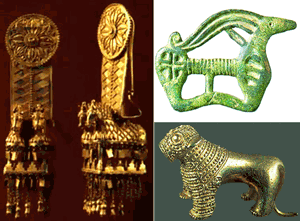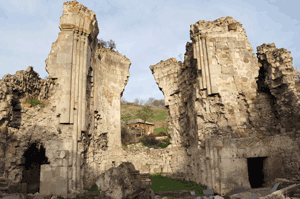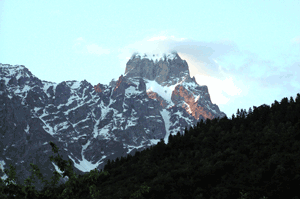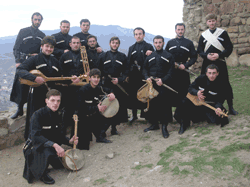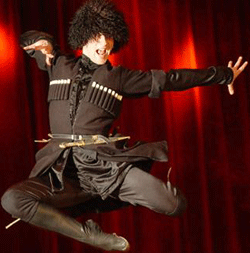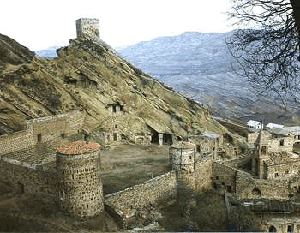|
||||||||||||||
GEORGIA
Shali Tour Invites you to a Black sea coast country bordered on the north by Caucasian chain of mountains which is higher than 500 meters and is called the forehead of the universe. “The Caucasian mountains with their space and height are the most spectacular among all the mountains situated in the direction of summer sunrise”-said Aristotel as early as in the 4th century BC… Cruel Zeus chained disobedient Prometheus to one of these frozen rocks because of his guilt.
Georgia is the motherland of first Europeans. Here there have been found skulls of the most ancient people living in Europe 1 million 800 thousand years ago. They are supposed to have been able to speak according to the structure of their mouths. In the country of “Golden Fleece” it is not only history that is amazing, but it is also the scenery that is rich in wonders. Here the nature itself is the creator… The great Georgian poet and thinker, Vazha –Pshavela said: “Who can love art as much as the nature itself can, which is itself” The region of great kingdom of Iberia and Colchis is the motherland of vine and wine, wheat and iron, polyphonic songs and energetic dances. Medicine is also connected to the name of Medea, the daughter of king of Colchis. She was a master of making drugs, poisons and antidotes. About 34 centuries ago Argonauts stole the “Golden Fleece” from Colchis, with an inscription carved on it: “Great Wisdom“; killed Apsirt - the heir of king Aietis and kidnapped Medea.
Colchis and Iberia were integrated as one state in the 4th-3rd centuries BC. These areas were populated by ancient Georgian tribes.They were the first in the world to begin working on iron and steel and contributed to mankind history that way as well. Georgia is the motherland of people who managed to resist conquerors moving from the East to Europe enabling Europe to develop.Georgia was the home of education from the start, though because of its geographical location many valuable things were destroyed. Besides having to fight against minor invasions, the Georgians also had to fight serious battles several times a year. They often had to fight against enemies attacking from different sides simultaneously. After several centuries the trace of the invaders can still be noticed at many places.
- During these invasions the Georgians always had to fight unequal battles. There were defeats and there were victories. The battle of 1121 is a clear proof of excellent Georgian war strategies. It was that year that the Georgian army, consisting of only 59 thousand fighters defeated the Muslim army with 40 000 fighters in it. With this victory Georgia became the arena of Orthodoxism on the Euro-Asian boundary. - The history of the country was most deeply affected by its neighbor holding the same faith, which in 1801 managed to impose its control on Georgia which was rather weakened by internal betrayal and started deliberately putting political bombs. Later, in 1921 now Soviet Russia annexed independent Georgia. That was the time when Georgia lost one thirds of its territory (18498 square km) including the population living on it. - Orthodoxy was declared as state religion of Georgia in the 4th century, AD. - In this country the renaissance of creativity started in the11th century. - The Georgian languages belong to Iberia-Caucasian language group. Out of the 14 written languages existing in the world one of them is Georgian. The Georgian alphabet is ancient. There are 33 letters in it. There are no capital letters, all the letters are equal. Everything is written as it is heard and everything is read as it is written, that is, combinations of several letters do not make different sounds. Georgian speech consists of distinct sounds
The capital of Georgia - Tbilisi, became the city of royal residence in the 5th century. religious clashes before the annexation by Russia. Here the relationship between resident Georgians and other ethnic groups was the equivalent of academic culture.
- Georgian creators and scientists, fighters and sportsmen have been recognized all over the world. - There is no traveler who has visited Georgia and has not fallen in love with it. Its ancient architecture, monumental art, diverse amazing scenery and hospitality leave unforgettable memories. - Georgia is the country of inspirations where many creators of different countries found their lost muses here.
- The year of 1898. The famous Norwegian writer, Knuth Hamsun is writing to a Dutch critic, George Brandes: “I am 38 years old and I have written so many books, but it seems to me I have written nothing. I am disappointed. I no longer believe in my talent.” In 1899 Knuth Hamsun arriving in Georgia thought: “Why do I have a feeling as it I have come back home?” After traveling in Caucasus he wrote a book called “The Fairy Land”, in which he said: “…I have drunk some water from the river Mtkvari and I have made the biggest mistake, because the one who tastes the water of the Mtkvari will care about Georgia all his life… I believe that this land is the residence of God” - The great French writer, Alexander Dumas also faced the same kind of creative crisis. For him Caucasus was a great arena of new adventures. - The masterpiece of the great Georgian poet, Shota Rustaveli, who lived in the 12th century, is “The Knight in the Panther’s Skin” which is preserved in the Treasury of World Literature. It has been translated into 44 languages. Only in Georgia it has been published in 136 different editions. One of Georgian polyphonic songs – “Chakrulo” is one of the wonders of the world to have been sent to space. As for
- Out of the vine species existing in Georgia, 500 of them are local and unique. There are two methods of producing wine in the world – “Kakhetian” and “European”. Kakheti is one of the regions of East Georgia producing wine according to European method, which is the same as it used to be in ancient Kolkhis. Nowadays this very method is used in West Georgia. - Georgian wheat is also unique. Out of all species of wheat existing in the world, 15 are Georgian. From here 5 of them can be found in Georgia. - Georgian beer and Georgian watchdog, with their virtues, enjoy great popularity among specialists. The motherland of the pheasant is also Georgia. - As for Georgian table, even well-known Indian and Chinese cooks find it difficult to compete with it. For gourmets Georgian dishes are unforgettable and Georgian wine is incomparable.- Out of the vine species existing in Georgia, 500 of them are local and unique. There are two methods of producing wine in the world – “Kakhetian” and “European”. Kakheti is one of the regions of East Georgia producing wine according to European method, which is the same as it used to be in ancient Kolkhis. Nowadays this very method is used in West Georgia.
- Georgian wheat is also unique. Out of all species of wheat - Georgian beer and Georgian watchdog, with their virtues, Chinese cooks find it difficult to compete with it. For gourmets Georgian dishes are unforgettable and Georgian wine is incomparable. |
||||||||||||||||||||||||||||||||||||||||||||
